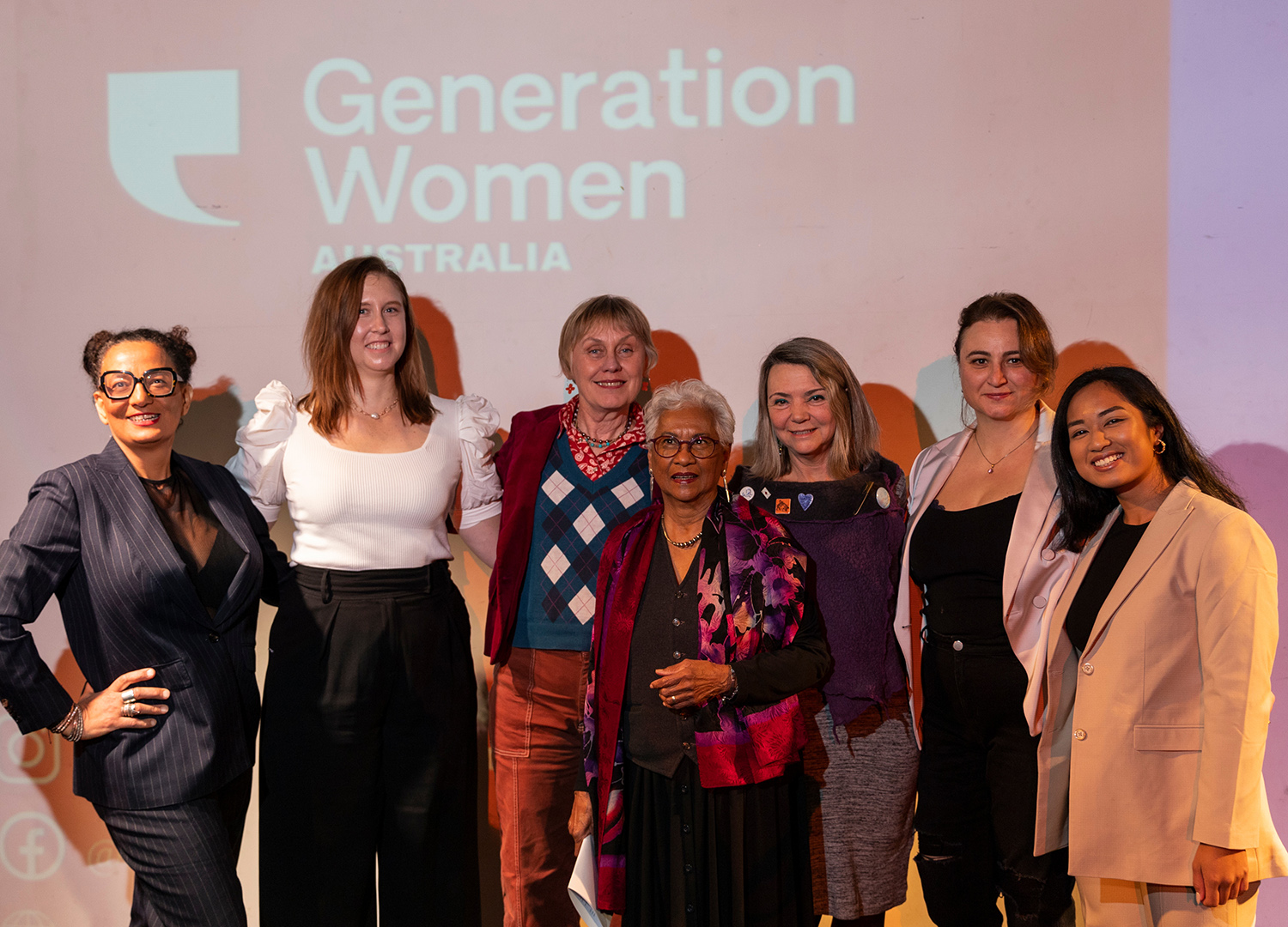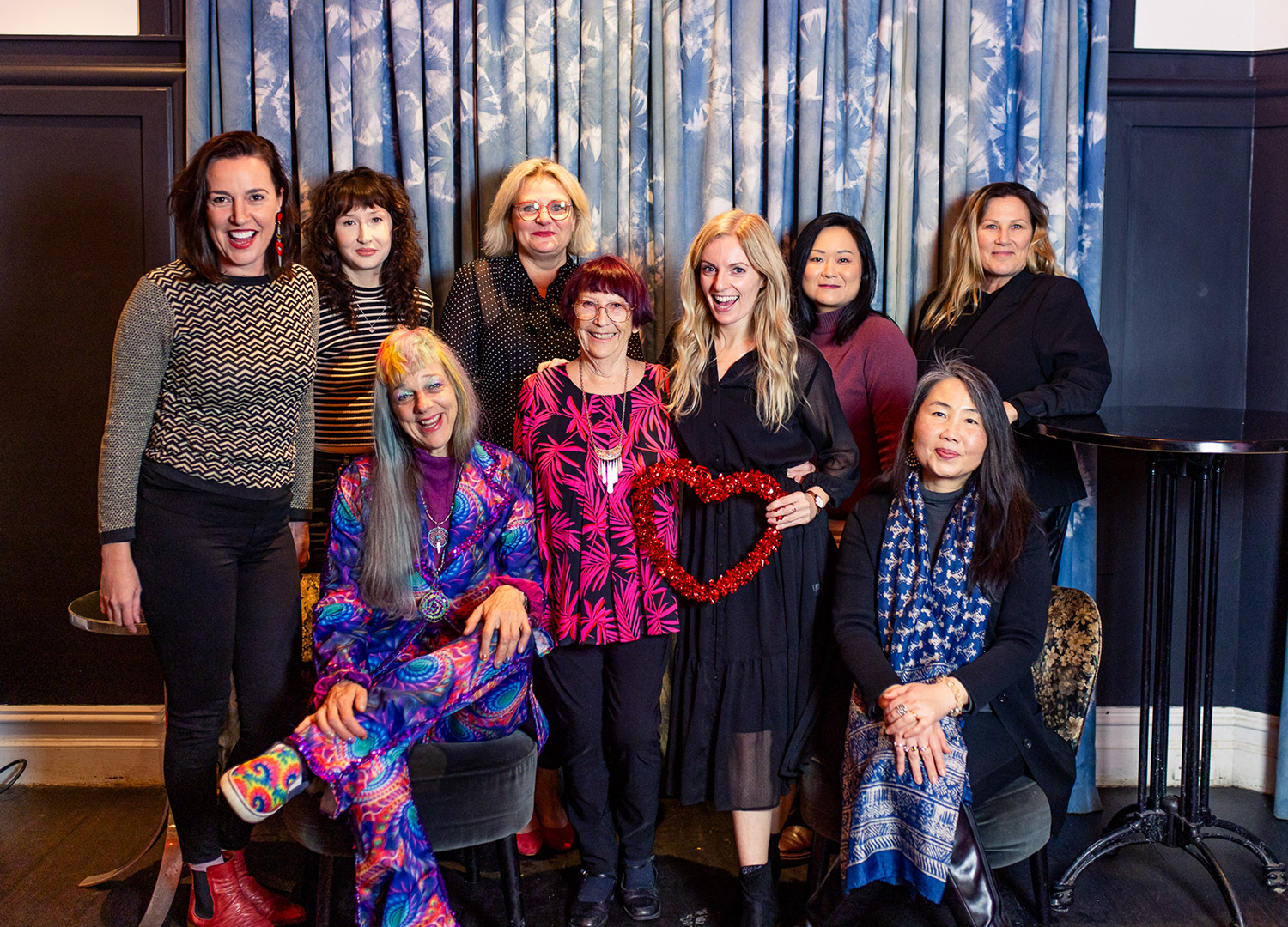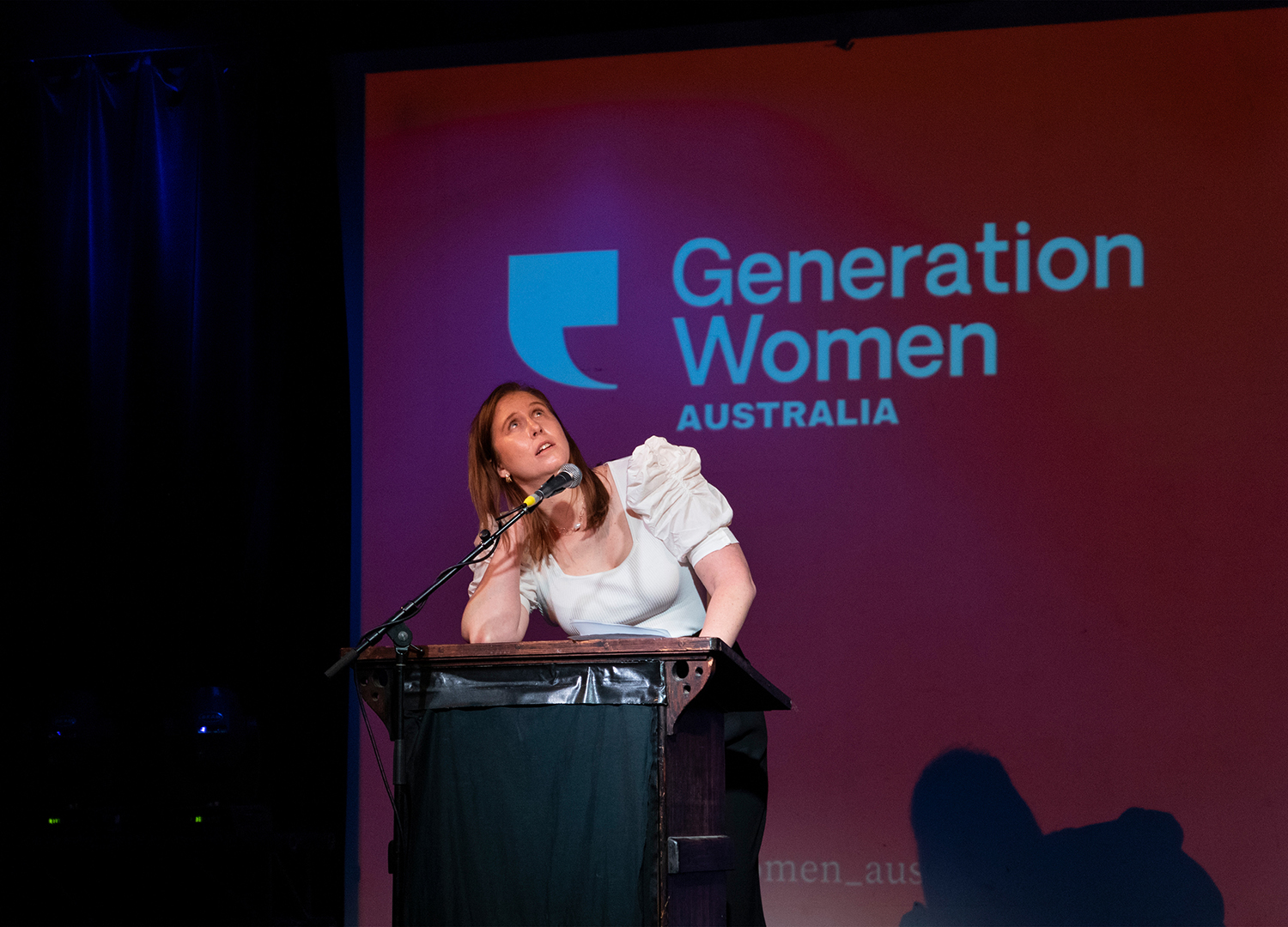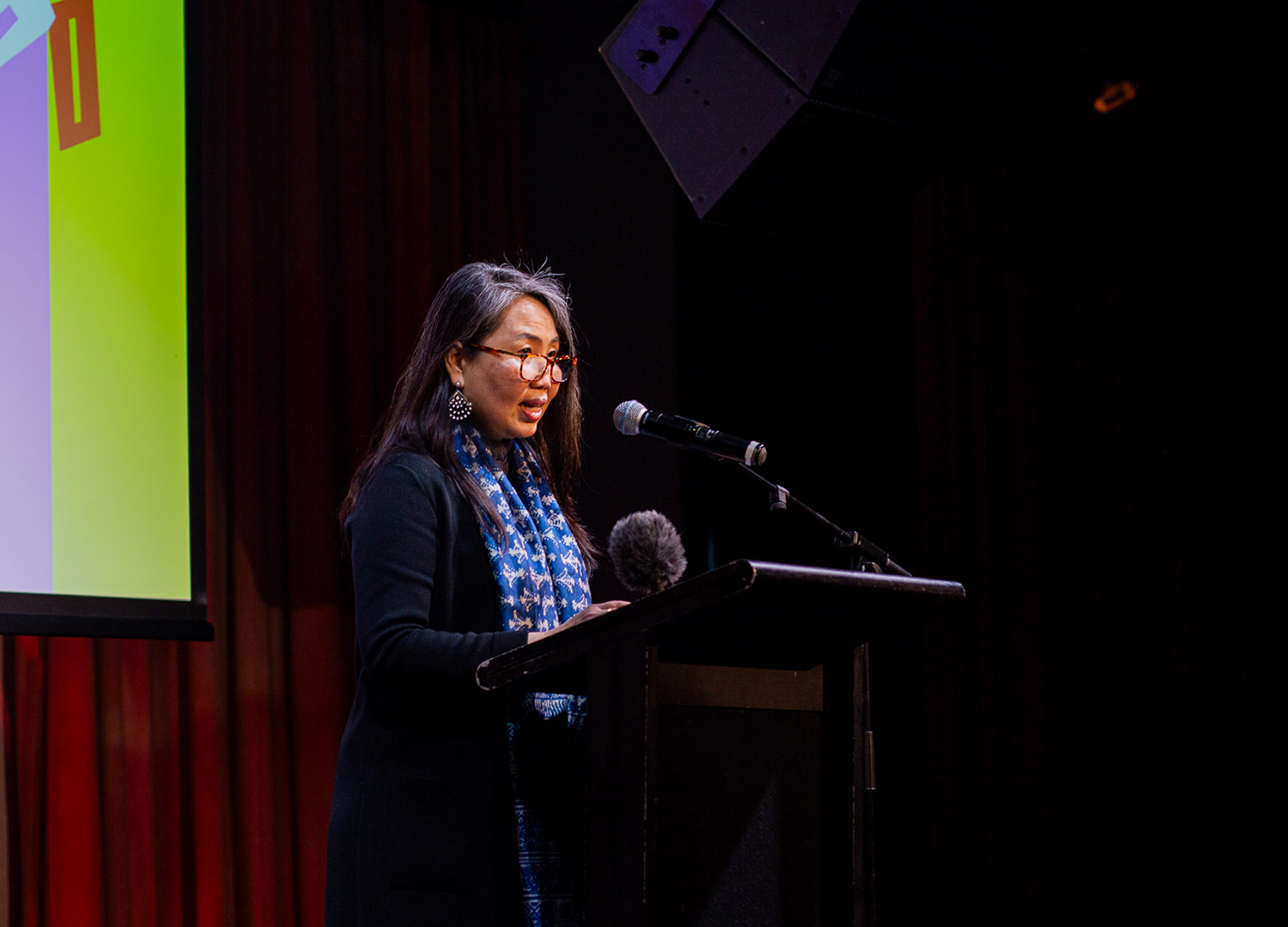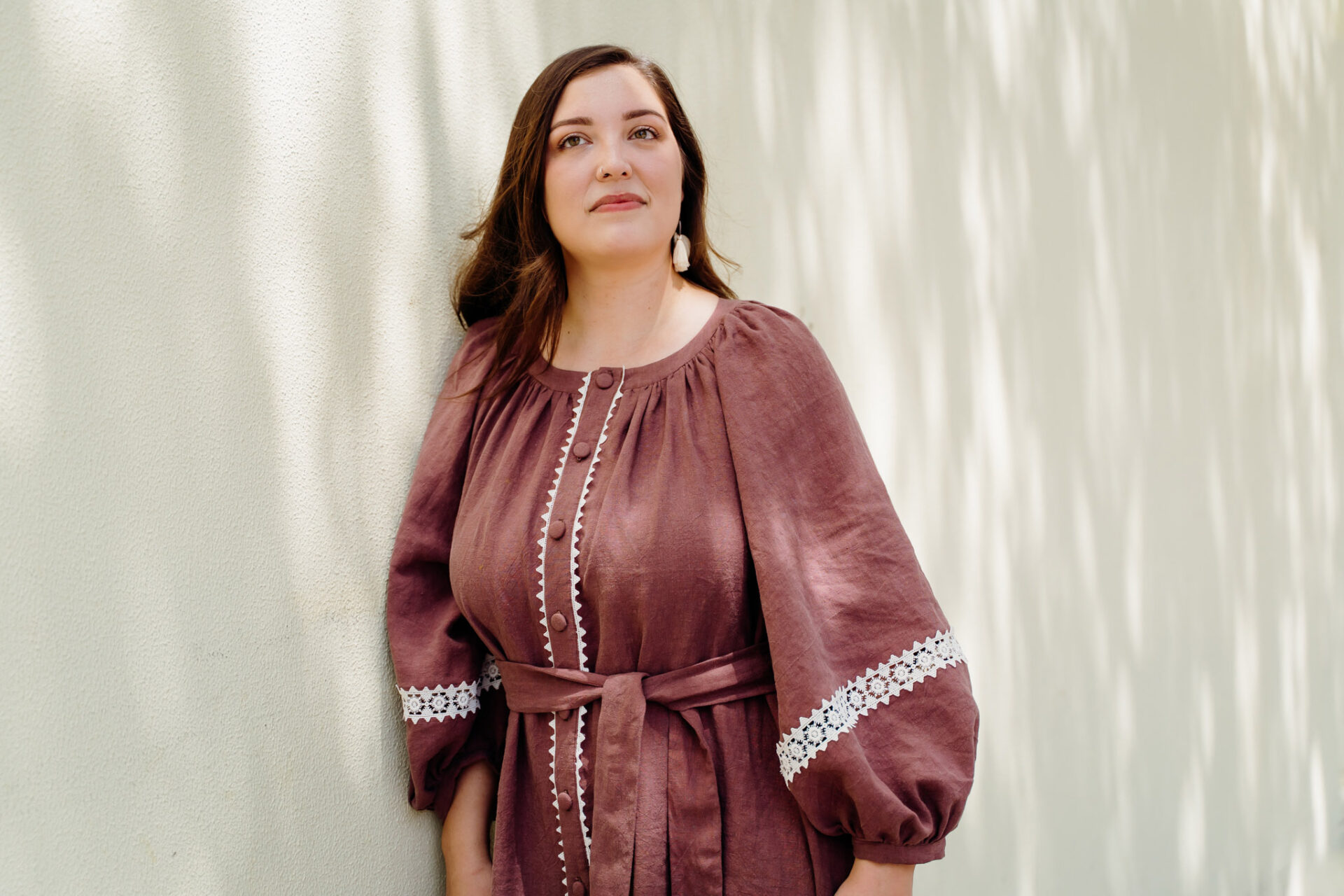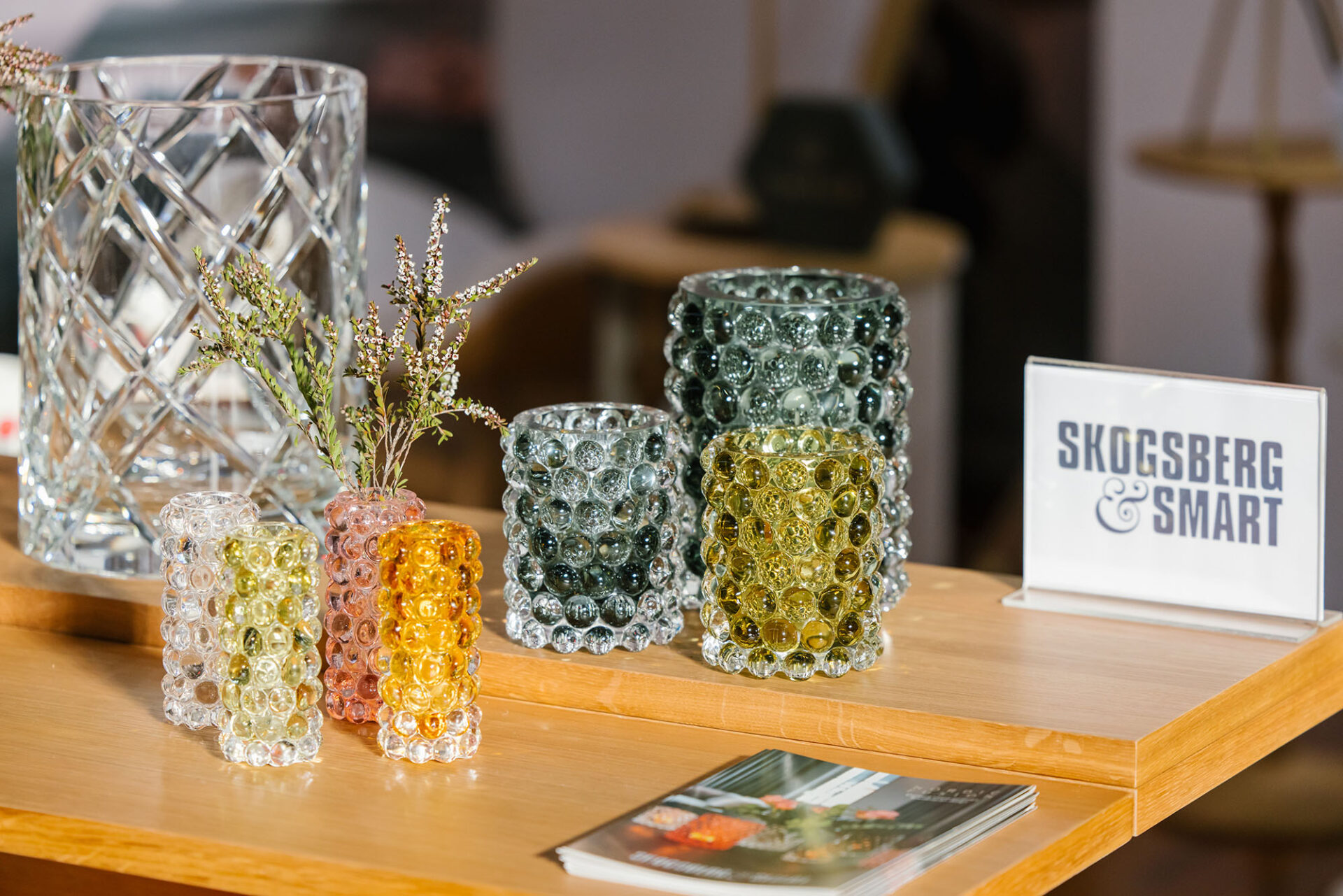“I Aspired Not to Be Ladylike – But to Be Humane”: Stories of Unladylike Behaviour

- Words by Peppermint
The voices of women, girls and non-binary folk have often been silenced when it comes to history, politics, science, art… well, you name it. But multigenerational storytelling night, Generation Women, is speaking truth to power, offering a warm and inclusive space where people of all ages can come together to share, celebrate and learn.
Held in Sydney and Melbourne, the monthly event aims to amplify a selection of female and non-binary voices – representing those in their twenties through to their seventies (and beyond) – each sharing their own stories on a specific theme.
top GENERATION WOMEN MELBOURNE JUNE PERFORMERS. PHOTO BY RENEE COSTER bottom GENERATION WOMEN SYDNEY JUNE PERFORMERS. PHOTO BY TENIOLA KOMOLAFE.
Peppermint is proud to partner with the Generation Women team to bring you a monthly series sharing the words and wisdom from some of the storytellers. June’s theme was ‘Break The Bias: Unladylike Behaviour’, with performers taking to the stage to talk about the times they spoke up, spoke out and refused to play nice. Here’s hoping they get you laughing, strutting and feeling your most unladylike.
For more information about Generation Women, including forthcoming events, head to their website here.
above JEN WARD SPEAKING AT GENERATION WOMEN MELBOURNE: BREAK THE BIAS! PHOTO BY RENEE COSTER.
Melbourne Storyteller Team 30s: Jen Ward
My height, build, boisterous tendencies and aversion to a timely RSVP have been a genetic rebellion against ‘ladylike’ behaviour and expectations. I’ve always been tall, never petite and I’ve leaned consistently towards speaking up over keeping quiet. In theory, these are all just facts about me. However, until my thirties, I felt like I needed to shrink myself to be more ladylike – literally by hunching over or by self-censoring in order to appease or be more palatable.
As a child, I never gave my physicality a second thought. But it seemed others not only gave it thought, but gave it their opinions.
I’m seven years old, and I’m with my parents doing the grocery shopping. I’m wearing my favourite bike shorts paired with my brother’s white Billabong top. I jump up onto the side of the trolley and look at my mum with a smile. She knows what that means. She pushes the trolley and we’re both laughing. My eyes are closed, my head is back and I feel like I’m flying! I whoop with joy when I’m snapped back to reality. “Isn’t he a bit old to be doing that and shouting so loudly?” a woman, with a trolley filled with haphazardly placed Pepsi bottles, accuses. My face feels really hot. What was I doing wrong? Mum says, “She is seven and there’s nothing wrong with what she is doing.” “Well, ‘She’ should act like a little girl,” the woman replies haughtily. I step gingerly off the trolley. I don’t want to do that again. It’s not fun anymore.
That night I’m in bed, sobbing, curled into a ball. Mum comes into my room and sits quietly, rubbing my back. She whispers to me, “You’re just ‘you’ and you’re perfect, never forget that.”
I went to an all-girls high school where ladylike behaviour was revered and rewarded – the school motto may have well as been, ‘Dainty. Dignified. Delightful.’ My motto was ‘Tall. Tomboy. Tempestuous,’
I’m 13 years old, distracting the class with my crow impression when my teacher walks in. “Jennifer! Stop that! And act like a lady!” My face feels hot, like when I was seven. My teacher scrawls on a bit of paper and hands it to me: “Give this to your parents.”
Mum picks me up from school and reads the note I hand to her. I start crying. “Mum, the teacher said I wasn’t a lady. She said it in front of everyone.” Mum reaches over to me, bringing me in for a hug, “You’re not a ‘lady’, you’re just ‘you’ and you’re perfect,” she says. “But maybe save the crow call for after class.”
Some of them looked at me with confusion, with irritation, but most looked at me with a sore neck.
As I moved through my teenage years and twenties, my fiercest rivals started to reveal themselves – men. I could see most men preferred my friends who were giggly, demure and slight-framed. They saw me (and my 183 centimetres of height, my raucous behaviour and my sense of humour) as a threat and they made that known – not overtly, but covertly. Through negging, backhanded compliments and challenges that were posed as questions. Some of them looked at me with confusion, with irritation, but most looked at me with a sore neck.
I’m 19, and I’ve been dating 28-year-old Brad for a few months. I walk into his house and his friends are there, I didn’t know that they would be. I go to say something and immediately stop. It’s not cute to whinge. “Hi,” I say gingerly to his friends. They barely look up from the TV. Later that night, we’re cuddling on his grey two-seater IKEA lounge, he turns to me and says, “My friends and I agree – you aren’t fat, but you’re definitely the biggest girl I’ve ever dated.” My face flushes and I feel ashamed. “Oh, ok,” I say. “Sorry.”
When I get home, Mum is sitting on the lounge, reading. She is wearing her nightgown and the glow from the lamp is shining down on her. She takes one look at my face and closes the book. “Jenny darling, what’s wrong?” I’m not crying this time, but I tell her what happened. She opens her arms, envelops me and whispers, “You are just perfect, just the way you are, remember that.”
I’m 32. I’m standing in my childhood bedroom, feet glued to the ground. I’m in shock. My mum has passed away, suddenly. I feel like I’ve been taken apart and put back together by someone who didn’t read the instruction manual.
Seven months pass and I’m with my psychologist. I’m sitting on the couch nursing the trusty tissue box. ‘To keep her close, try thinking about what she’d say to you in certain circumstances,” she suggests gently. I nod.
I’m at a chemist, minding my own business and a guy in his late fifties, who’s last five strands of hair are working overtime, looks at me and says, ‘‘Gee, you’re tall.” I immediately reply, “Gee you’re bald, fuck off.”
What was that? I have never, ever said anything like that in my life. Once the blood stopped pulsing in my ears, I swear I hear Mum’s voice tell me I am ‘perfect’ and to ‘never forget it’ with an added, “But perhaps not so much swearing sweetheart.”
As time progressed, it happened again, multiple times. I had found my voice and self-belief through Mum’s voice and self-belief; shrugging off societal norms by confidently dating a man significantly shorter than me even though, “When we were nose to nose, his toes were in it and when we were toes to toes his nose was in it.”
I was trying to be what society thought I should be, rather than what my mum knew me to be. What for? Now I don’t care when people ask me why I’m so tall. Were my parents tall? Was I a swimmer? Did I like being tall? Am I wearing heels? I mainly say “yes” or something that, quite literally, goes straight over their head.
I then took this new-found acceptance to the next level.
I’m 36 and at a drag king workshop – learning the basics of how to perform an essentially male stereotype. We’re in a converted garage and the mirror ball is catching the light off the glitter curtains. I introduce myself: “My name is Jen. I’ve always hidden the things that I treasured the most about myself purely because they weren’t deemed ‘ladylike’, and therefore I wasn’t ladylike. I don’t want to do that anymore, so I’m here to learn how to develop a caricature of my masculine self,” I mansplained to the group.
The group starts chanting, “Yes, King!”
The facilitator asks, “And what’s your drag name, King?” to which I knew there was only one answer. I look around the room at the smiling faces and say proudly, “Max Height.”
above YUMI LEE SPEAKING AT GENERATION WOMEN SYDNEY: BREAK THE BIAS! PHOTO BY TENIOLA KOMOLAFE.
Sydney Storyteller Team 50s: Yumi Lee
Allow me to share my shame of how ladylike I am. I was walking back to my room on campus on a very cold afternoon in Norwich. It was one of those endless grey cold English autumn days – the type before global warming – more than 35 years ago. I could see a man walking very fast towards me. He was dressed in a tweed suit with a vest and tie. I thought nothing of it. After all, this was a common garden variety, very pale Englishman in a suit. However, I was obviously not the common variety local as he came right up to me, and said in a very loud voice, “Do you come from Thailand?” I was stunned. What would one say in such a situation? “Excuse me?” Maybe, “Mind your own business.” Or even, “Fuck off.” Unfortunately – and I use this word deliberately – much to my shame today, I said, “Oh, I’m sorry. I’m not from Thailand.”
Therein lies the problem. This is the response of a girl who had been successfully educated not to be unladylike and speak her mind. Very much like my Singaporean friend who was also studying at the same university. Imagine, a Chinese girl, nearly 40 years ago, who has come from a culture where you find virgins only on the marriage bed, and who had never been kissed, attending university abroad. Let’s call her Christine. She had just started the semester and was out shopping for groceries. She bumped into one of the mature-aged students, Ahmed from Morocco, who she had seen around her college. She politely said hello and made small talk as they stood outside a shop. He suddenly said, “Christine, I want to sleep with you tonight.” Imagine her horror. When she told me this, her eyes were wide open, and she said, “Yumi, can you believe this man? Who does he think I am?” I asked, “So, did you give him a piece of your mind?” She looked at me. And she said, “I told him ‘Sorry, I have to write an essay tonight.’”
This is how successfully we have been schooled to be ladylike – to contain our rage, our anger, our displeasure, to mask all these feelings with a veneer of politeness.
It’s even worse when you add into the unladylike mix all the various restrictions of what ladylike behaviour is meant to be in different cultures. My mother is Japanese but I grew up very far away from Japan so I am most “un-Japanese” in my interactions. Perhaps the only giveaway that I am Japanese is that I am always 30 minutes early for appointments. (I am slowly getting cured of that.)
I certainly do not behave in Japanese ladylike ways. I recall organising an event in Kathmandu while I was living there some years ago. This was after the devastating 2011 Tōhoku tsunami. I worked with the Japanese women living in Kathmandu to put on a fundraising concert for the survivors. I recall having a discussion – not a fight, a discussion – about how many paper cranes should be made for the stage. Later, my mother, who was living with me at the time, said in a very disappointed tone, “Yumi, they say you are too strong.” Too strong for Japanese women, but definitely not strong enough for Englishmen, right?
I can’t tell you how much I want to shed this label, to be ‘ladylike’. And I don’t like the label ‘gentlemanly’ either. It restricts us in expectations of very gendered behaviour and doesn’t recognise the different genders who make up our community. It also reeks of class. It’s a bias against those who cannot afford to stick their pinkie finger out when they drink tea out of Wedgwood china. I want to replace it with the term ‘humane’ instead. So we can all aspire to be kind and to be compassionate. It is a gender-inclusive and class-free term.
I aspired not to be ladylike – but to be humane and true to myself in my interactions.
I was working for a charity in Hanoi some years ago which rescued Vietnamese girls and women who were trafficked to the sex trade in China. It was dangerous work undertaken with great skill and intelligence by one of my colleagues. As I was involved in fundraising, it was my role to promote good donor relations because these rescues are not only dangerous but also very expensive. It was expensive to get the girls out of China, and expensive to rehabilitate and reintegrate them into society. The organisation, therefore, did most of its fundraising in the USA and Australia. I aspired not to be ladylike – but to be humane and true to myself in my interactions, both with the survivors of trafficking and those who wanted to help them.
As Vietnam is one of the world’s top tourist destinations, it wasn’t surprising for these foreign donors to visit the headquarters of the charity situated on the fringe of Hanoi. One day, we hosted a very tall, very white, American man. I took him through the building, explaining the work that the organisation does and providing case studies of the trafficked victims. It was a hot Hanoi summer, and he was clearly suffering from the humidity and sweating profusely. “Yumi,” he said. “Let me tell you something. I was a US Marine. I can go with your man to China and get those girls out.” In my head, I thought, “Yup. Tall white man, with ginger hair, a ginger beard. That’s how you go incognito to rescue trafficked girls in a land full of Chinese people with black hair and no beards. That’ll work.”
What could I tell the ex-American marine who probably thought he could wave his AK-47 around and kick doors down to get girls cowering in a corner out of danger, whisk them to a waiting helicopter and fly them back to Hanoi? I looked at him impassively, with a straight face – this is where the stereotypical inscrutable Asian features come in handy – and said as humanely as I could, “Mr William, thank you for your generous offer. A lot of this work is done undercover, and as you don’t speak Chinese, it may not work so well.” Thankfully, Mr William, the ex-American Marine, seemed to accept that this was a reasonable rejection of his incredible offer and instead, made a cash donation.
We should definitely break the bias – in every stereotype – because labels restrict and limit us. And in our patriarchal world where women cannot exercise their rights fully, to aspire to be ‘ladylike’ according to the various cultures is to be complicit to keep the patriarchy going. I would like to instead encourage all younger women to ditch being ‘ladylike’ and instead, to be powerfully humane because we certainly need a world that is more powerfully humane. For all of us to recognise that we each deserve a place under the sun regardless of who we are, and for us to be treated with dignity and respect.
So, to the Englishman who thought I was Thai and didn’t even bother with a greeting, I want to say, “Good afternoon to you too.”
To Ahmed from Morocco, I wish Christine would have said, “I don’t do one-night stands.”
To the Japanese women who thought I was too strong, I wish my mother would have said, “I am proud I brought up a strong woman. I don’t want anyone walking all over her.”
Here’s to all the strong, unladylike, powerfully humane women – may we know them, may we be them and may we raise them.
READ MORE: “Seize This Moment”: Women from 20 to 70 Share Stories of Revolution
JOIN OUR MAILING LIST
Brighten up your inbox with our not-too-frequent emails featuring Peppermint-related news, events, competitions and more!
explore
More articles
Look, I don’t want to make anyone panic but IT’S DECEMBER!!! If you’re planning to give homemade gifts, you’re going to have to act fast. …
Hang out with us on Instagram
🌻 The Paddington 🌻
This is a much-loved staple, created for Issue 50 in 2021. We love seeing the #PeppermintPaddingtonTop continually popping up in our feeds!
How stunning is our model Elon MelaninGoddessEfon – she told us it was one of the first times she had been asked to come to a shoot with her natural hair. 🌻
We worked with South African patternmaker Sarah Steenkamp of @FrenchNavyNow_ to create this wardrobe essential – the perfect puff-sleeve blouse. Raglan sleeves make it the ultimate beginner sew, plus the gorgeous back buttons let you add your own personal twist.
Pattern via the link in bio! 🪡
Photos: @KelleySheenan
Fabric: @Spoonflower
Model: MelaninGoddessEfon

“In the 1940’s, Norwegians made and wore red pointed hats with a tassel as a form of visual protest against Nazi occupation of their country. Within two years, the Nazis made these protest hats illegal and punishable by law to wear, make, or distribute. As purveyors of traditional craft, we felt it appropriate to revisit this design.”
Crafters have often been at the heart of many protest movements, often serving as a powerful means of political expression. @NeedleAndSkein, a yarn store in Minnesota, are helping to mobilise the craftivists of the world with a ‘Melt The Ice’ knitting pattern created by @Yarn_Cult (with a crochet pattern too), as a way of peaceful protest.
The proceeds from the $5 pattern will go to local immigrant aid organisations – or you can donate without buying the pattern.
Raise those needles, folks – art and craft can change the world. 🧶
Link in bio for the pattern.
Images: @Gather_Fiber @NeedleAndSkein @a2ina2 @KyraGiggles Sandi.204 @WhatTracyMakes AllieKnitsAway Auntabwi2
#MeltTheIce #Craftivism #Knitting #CraftForChange

TWO WEEKS TO GO! 🤩
"The most important shift is moving from volume-led buying to value-led curation – choosing fewer, better products with strong ethics, considered production and meaningful stories. Retailers have real influence here: what you buy signals what you stand for. At Life Instyle, this means using the event to discover and invest in small-scale, planet-considerate brands that align with your values and your customer’s conscience. Consumers don’t need more things; they need better things, and retailers play a key role in selecting, contextualising, and championing why those products matter."
Only two more weeks until @Life_Instyle – Australia`s leading boutique retail trade show. If you own a store, don`t miss this event! Connect with designers, source exquisite – and mindful – products, and see firsthand why this is Australia’s go-to trade show for creatives and retailers alike. And it`s free! ✨️
Life Instyle – Sydney/Eora Country
14-17 February 2026
ICC, Darling Harbour
Photos: @Samsette
#LifeInstyle #SustainableShopping #SustainableShop #RetailTradeEvent

Calling all sewists! 📞
Have you made the Peppermint Waratah Wrap Dress yet? Call *1800 I NEED THIS NOW to get making!
This gorgeous green number was modelled (and made) by the fabulous Lisa of @Tricky.Pockets 🙌🏼
If you need a nudge, @ePrintOnline are offering Peppermint sewists a huge 🌟 30% off ALL A0 printing 🌟 when you purchase the Special Release Waratah Wrap Dress pattern – how generous is that?!
Head to the link in bio now 📞
*Not a real number in case that wasn`t clear 😂
#PeppermintWaratahWrapDress #PeppermintPatterns #SewingPattern #WrapDress #WrapDressPattern

8 Things to Know About January 26 - from @ClothingTheGaps:
Before you celebrate, take the time to learn the truth. January 26 is not a day of unity it’s a Day of Mourning and Survival for Aboriginal and Torres Strait Islander peoples.
It marks the beginning of invasion, dispossession, and ongoing colonial violence. It’s time for truth-telling, not whitewashed history.
Stand in solidarity. Learn. Reflect. Act.
✊🏽 Blog written by Yorta Yorta woman Taneshia Atkinson.
🔗 Link in bio of @ClothingTheGaps to read the full blog
#ChangeTheDate #InvasionDay #SurvivalDay #AlwaysWasAlwaysWillBe #ClothingTheGaps

As the world careens towards AI seeping into our feeds, finds and even friend-zones, it`s becoming increasingly hard to ignore.
We just wanted to say that here at Peppermint, we are choosing to not print or publish AI-generated art, photos, words, videos or content.
Merriam-Webster’s human editors chose `slop` as the 2025 Word of the Year – they define it as “digital content of low quality that is produced usually in quantity by means of artificial intelligence.” The problem is, as AI increases in quality, it`s becoming more and more difficult to ascertain what`s real and what`s not.
Let`s be clear here, AI absolutely has its place in science, in climate modelling, in medical breakthroughs, in many places... but not in replacing the work of artists, writers and creatives.
Can we guarantee that everything we publish is AI-free? Honestly, not really. We know we are not using it to create content, but we are also relying on the artists, makers and contributors we work with, as well as our advertisers, to supply imagery, artwork or words created by humans. AI features are also creeping into programs and apps too, making it difficult to navigate. But we will do our best to avoid it and make a stand for the artists and creatives who have had their work stolen and used to train AI machines, and those who are now losing work as they are replaced by this energy-sapping, environment-destroying magic wand.
Could using it help our productivity and bottom line? Sure. And as a small business in a difficult landscape, that`s a hard one to turn down. We know other publishers who use AI to write stories, create recipes, produce photo shoots... but this one is important to us.
`Touch grass` was also a Merriam-Webster Word of the Year. We`ll happily stick with that as a theme, thanks very much. 🌿

